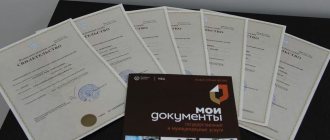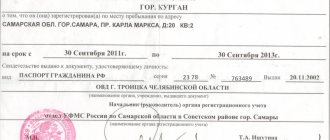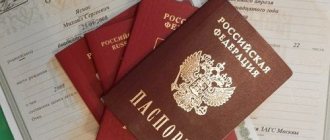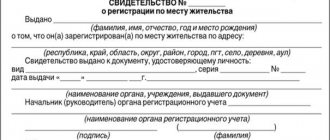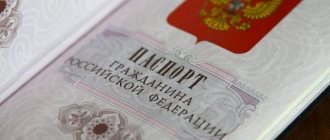Place of residence or domicile as correct
Place of residence is a combination of two separate words, the second is used in the genitive case. When a phrase is declined, the first word changes its form according to cases. Documents are submitted upon change of residence. We do not know their place of residence. No one saw the person at his place of residence.
Place of residence is a noun that is recorded in Russian language dictionaries. When a word is declined, the ending of the word changes. Mainly used as a legal concept in official business style of speech. The person does not have a permanent residence. The suspect's residence has not been established. The person did not show up at his place of residence.
Place Accommodation How to Spell
Place of residence - (Latin domicilium; English abiding place, dwelling place) a place where a citizen permanently or primarily resides as an owner, under a lease (sublease), lease agreement or on other grounds provided for by law... ... Encyclopedia of Law
By analogy with English, they also have two concepts: 1) place of residence (place of residence - in human terms, without additional connotations in meaning) and 2) domicilium (place of location of a person and his activities, and the person is both physical and legal is more applicable).
Permanent residence status in Bulgaria
The permanent residence status in Bulgaria is based on the residence permit status.
A residence permit is a status that gives a foreign citizen the opportunity to reside on the territory of the Republic of Bulgaria within the permitted period (no more than a year), without the need to apply for tourist visas with limited periods of permissible stay[3].
The grounds for obtaining a residence permit are determined by Articles 24 and 25 of the Law “For Aliens in the Republic of Bulgaria”[4].
A residence permit is issued within 2–6 weeks, is valid for one year and is renewed annually[3].
Any foreign citizen who has lived in Bulgaria with a residence permit status for at least 5 years has the right to obtain permanent residence
, subject to the conditions of residence in the country specified in Article 25 of the Law “For Aliens in the Republic of Bulgaria” [4]:
over the last 5 years of residence permit status, the foreigner has not been absent from Bulgaria for more than 30 months in total
[5]
.
Permanent residence status is an internal (Bulgarian) status and gives the same rights as citizenship in Bulgaria, with the exception of the rights to vote and be elected to public authorities[5].
In the Republic of Bulgaria, for foreign citizens, the same Law “For aliens in the Republic of Bulgaria” definitely provides a long-term residence permit, which differs from permanent residence status in that it has a limited period of stay in the country and a much smaller state fee for this permit[5].
Domicile or place of residence - which is correct and why
- bank of the river of the village (at the bank of the river of the village, bank of the river of the village)
- Vaska's cat food (no, it Vaska cat food )
- Petrov's grocery store is around the corner (there are no products from the store and Petrov's is around the corner)
- steep rise of the road behind the bridge (at the steep rise of the road behind the bridge, we will approach the steep rise of the road behind the bridge)
- burial excavation site (near burial excavation sites)
- Peter’s place of residence (near Peter’s place of residence; new places near Peter’s residence)
- “Registration at place of residence.”
- “His registered place of residence is in Moscow.”
- “The place of residence of these peoples is the mountains.”
- “I will change my place of residence as soon as possible.”
- “When you change your place of residence, a lot can change in life.”
- “The new place of residence has been given a special status.”
You need to leave your previous place of residence. Is it possible to do this without immediate
You need to register within the current time. 7 days in a new place, at your place of residence, otherwise a fine.
Article 19.15.1. Residence of a citizen of the Russian Federation at the place of stay or at the place of residence in a residential building without registration
[Code of the Russian Federation on Administrative Offences] [Chapter 19] [Article 19.15.1]
1. Residence of a citizen of the Russian Federation at the place of stay or at the place of residence in residential premises without registration, or permission of such residence by the tenant or owner of this residential premises beyond the time limits established by law -
entails the imposition of an administrative fine on citizens in the amount of two thousand to three thousand rubles; for tenants, owners of residential premises (individuals) - from two thousand to five thousand rubles; for legal entities - from two hundred and fifty thousand to seven hundred and fifty thousand rubles.
2. The violation provided for in Part 1 of this article, committed in the federal city of Moscow or St. Petersburg, -
entails the imposition of an administrative fine on citizens in the amount of three thousand to five thousand rubles; for tenants, owners of residential premises (individuals) - from five thousand to seven thousand rubles; for legal entities - from three hundred thousand to eight hundred thousand rubles.
Note. Citizens of the Russian Federation are exempt from administrative liability for an administrative offense provided for in this article in the following cases:
residence without registration at the place of residence in a residential premises located in the corresponding locality of a constituent entity of the Russian Federation, if they are registered at the place of residence in another residential premises located in the same or another locality of the same constituent entity of the Russian Federation;
residence without registration at the place of residence in a residential premises located in the federal city of Moscow or in one of the populated areas of the Moscow region, if they are registered at the place of residence in a residential premises located in the federal city of Moscow or in one of the populated areas of the Moscow region;
residence without registration at the place of stay in a residential premises located in the federal city of St. Petersburg or in one of the populated areas of the Leningrad Region, if they are registered at the place of residence in a residential premises located in the federal city of St. Petersburg or in one of the populated areas points of the Leningrad region;
if they are spouses, children (including adopted children), spouses of children, parents (including adopted), spouses of parents, grandparents or grandchildren of a tenant (owner) of a residential premises who is registered at the place of residence in this residential premises;
if the persons living together with the tenant or the owner of the residential premises are in relation to him spouses, children (including adopted children), spouses of children, parents (including adopted ones), spouses of parents, grandparents or grandchildren.
Place Accommodation How to Spell
place of residence - Place of residence, the frequently encountered phrase address of place of residence should be considered unacceptable, since place of residence means “the place where someone lives,” address means “indicating the place of residence of someone”; each of these... ... Dictionary of Russian language errors
residence - place of stay The country of residence of an individual in which he pays taxes. Under UK tax law, domicile is determined for each tax year. When establishing the place of residence of a person... Technical Translator's Directory
Place Accommodation How to Spell
When we officially talk about place of residence, we usually say: “residence”, “place of residence”. Some people believe that you should not say or write “residence.” This is not the case, which is fully confirmed by dictionaries and reference books - for example, the well-known and popular Russian literacy portal gramota.ru. Therefore, you can remember: both forms of using words are correct. The main common difficulty is an error in spelling the ending in the phrase “place of residence.” Let's look into this issue. How to speak and write correctly? Correctly speak and write - PLACE OF RESIDENCE. Here we see TWO separate words that are combined into a phrase of TWO WORDS. You can read about what a phrase is here (written in simple and understandable language). We see that the words in a phrase always go “in conjunction”, one after another, and the endings of the words change according to the rules of grammar. Take a look below and watch. Examples of phrases in Russian:
Interesting: Land Tax Moscow 2020 Benefits for Chernobyl victims
By analogy with English, they also have two concepts: 1) place of residence (place of residence - in human terms, without additional connotations in meaning) and 2) domicilium (location of a person and his activities, and the person is both physical and quot ;more applicablequot; legal).
Permanent residence and individual housing construction
Citizens of the Russian Federation can obtain permanent residence not only by registering in an already built living space, but also thanks to such a concept as individual housing construction. The abbreviation IZHS stands for individual housing construction, and denotes a type of providing people with living space, based on the right of personal property. The structure is being erected at the expense of the land owner, but there are some restrictions on the format of the building itself. According to the rules of individual housing construction, the house should not be more than three floors and is designed for permanent residence of one family. This term is usually used in the following connection: “a person is registered at the place of residence on a plot with the possibility of individual housing construction.”
Place of residence as spelled
a legal concept established in the types of correct administration of justice (M. jurisdiction is determined, see), the commission of certain legal acts (marriage, establishment of guardianship, fulfillment of obligations, etc.), the performance of a number of public duties and the use of related rights. It is assumed that every person has somewhere the main focus of his interests and his existence and that it is in this place that he can most likely be found in case of need. This place is called legal M. persons (domicilium, Wohnsitz). The old police state assumed for each person a mandatory M. (d. necessarium), at the place of his assignment to one or another estate, class or occupation; absence from M. was allowed only with the permission of the authorities, according to the passport, which indicated the place of absence. With the development of freedom of movement in the West, the assumption of necessary M. has also lost its meaning. According to modern Western law, M. is determined voluntarily (d. voluntarium) and is stated according to a number of factual signs, making it possible to conclude that a given person has a more permanent connection with a certain place of residence, than with others. French law presupposes, however, that every person must certainly have M., and only one, in the legal sense. Some German legislation recognizes that persons of certain categories still have mandatory M., namely officials - at the place of their service, military personnel - at the location of their units, etc. The new all-German code denies the obligatory nature of one M. and allows for the possibility of several , recognizes the existence of people without M. (wandering actor, etc.) and extends the concept of voluntary M. to officials. According to modern German law, only military men have obligatory marriage in the places of their regiments or garrisons, wives in the husband’s marriage, children in the father’s, guardians in the guardians, and legal entities in the location of their departments or companies. In Russian law, there are still two types of definitions of residence. On the one hand, the decrees of laws on states, civil and other laws on compulsory mobility of persons of different classes and restrictions on their freedom of movement are valid (see). “Permanent M. is considered to be the place: 1) where someone is obliged to serve or is in the department thereof; 2) where his real estate is located, in which he has a permanent residence, and 3) where someone, having been recorded in the books of the nobility, city or audit, has a residence” (Article 2 of the Constitution on the Pas.). The passport still serves as a guarantee of the preservation of these definitions, which allow for a number of exceptions (see Collection of civil laws, edited by Messrs. Gozhev and Tsvetkov, art. 230 - 330, 11602 - 3). On the other hand, the resolution of Art. 204 Set. citizen court: “Permanent residence is established where someone, due to his occupation, trade or property, or military or civil service, has a settled residence or home establishment.” The determination of this actual place of residence is made by the court regardless of the above police decisions (cass. decisions 82/29, 78/41, etc.). Art. 205 allows for the existence of several M. for one person, and Art. 206 - the possibility of the existence of persons completely without M. For the field of civil proceedings, we have, therefore, the full force of the beginning of voluntary M. The Russian civil court knows the necessary M. only for wives, children, wards and legal entities. Relations between private individuals and the court are determined in our country according to the incomparably more convenient principles of voluntary justice; relations between administrative places and private individuals are determined according to the old rules.
Interesting: Helping young families purchase housing from the state in Rubtsovsk
By analogy with English, they also have two concepts: 1) place of residence (place of residence - in human terms, without additional connotations in meaning) and 2) domicilium (location of a person and his activities, and the person is both physical and quot ;more applicablequot; legal).
Questions and answers
Dear lawyers! Please tell me how to correctly fill out form 14001, namely clause 3.6.2 (address of the place of residence outside the Russian Federation) in sheet K. There is a change of director, the new director lives outside the Russian Federation (in Ukraine), how to correctly write the full address of the place of residence should it be written without abbreviations (village of Vasilyevka) or with abbreviations (village of Vasilyevka), or does it not matter?
Expert:
Form 14001 Dear lawyers! Please tell me how to correctly fill out form 14001, namely clause 3.6.2 (address of the place of residence outside the Russian Federation) in sheet K. There is a change of director, the new director lives outside the Russian Federation (in Ukraine), how to correctly write the full address of the place of residence should it be written without abbreviations (village of Vasilyevka) or with abbreviations (village of Vasilyevka), or does it not matter? Daria Write it as it is in your passport. In general, filling out documents is a paid option, and the answer here is given for informational purposes only. No one will be held responsible if this document is not accepted for one reason or another.
Expert:
The form is filled out in a special program, so it is better to contact a specialist and fill out the document correctly, otherwise you will simply be denied registration and you will lose money and time.
How is place of residence legally determined?
What procedures are there to determine it?
How does it differ from the place of registration?
Is it possible to replace the place of registration (residence) with a place of stay?
This is important to me now.
Expert:
How is place of residence legally determined? What procedures are there to determine it? How does it differ from the place of registration? Is it possible to replace the place of registration (residence) with a place of stay? Dmitry Legally, the place of residence is determined by the resident himself. If he indicates this place, then it is considered to be his place until proven otherwise. The place of registration is the place where the citizen registered with the registration authorities. As for the replacement, it depends on what occasion you are going to replace it for.
I am an individual entrepreneur. I am going to apply to the arbitration court to recover the amount from another individual entrepreneur.
A registered claim letter sent to the address specified in the contract was returned after lying in the mail for a month. The same fate, apparently, awaits the letter to which his claim and copies of the attachments will be sent.
The MIFTS does not provide an extract from the Unified State Register of Individual Entrepreneurs containing information about the place of residence.
Question:
1) taking into account the requirements of clauses 1, 7, 9, part 1, art. 126 of the Code of Civil Procedure of the Russian Federation, does it make sense to indicate his invalid address of residence, and immediately apply for a full extract from the MIFTS, and what to attach as a document confirming the direction and delivery of a copy of the claim with attachments?
2) if from the received full extract it turns out that he has not changed his address (he himself is alive and well and conducting business) but will not respond to court summonses, will court hearings be postponed and until when?
!
Expert:
Indicate the address that you know (in this case from the contract).
Here it makes sense to pay attention to Art. 20 of the Civil Code “A citizen who has provided creditors, as well as other persons, with information about his other place of residence, bears the risk of the consequences caused by this.”
According to Article 126 of the Code of Civil Procedure, you do not have a claim, but a writ.
If we are talking about 126 Code of Civil Procedure, then when a court order is issued, the parties are not summoned and, accordingly, it does not matter whether your counterparty will respond to court notices (objections to the issuance of a court order).
Expert:
The tax office wrongfully refused to issue the relevant extract.
In accordance with clause 9, part 1, art. 126 of the Arbitration Procedure Code of the Russian Federation, an extract from
the unified state register of legal entities or
the unified state register of individual entrepreneurs indicating information about
the location or
place of residence
of the plaintiff and
defendant
and (or) the acquisition by an individual of the status of an individual entrepreneur or the termination by an individual of activities as an individual entrepreneur or another document confirming the specified information or lack of such.
According to clause 25 of the Rules for maintaining the unified state register of individual entrepreneurs and providing the information contained therein, approved by Decree of the Government of the Russian Federation of October 16, 2003 N 630 (hereinafter referred to as the Rules), information about the individual entrepreneur provided for in Appendix No. 2 hereto The Rules, with the exception of subparagraphs “c”, “e”, “g”, “h”, “i”, “p” of paragraph 1 of the specified appendix, are provided at the request of any legal entity or individual, drawn up in any form and containing the requested information
, in the form of an extract from the state register in the form specified in Appendix No. 5 to these Rules.
If any information is missing, the word “no” is written in the corresponding column. Information about the place of residence in the Russian Federation - the address at which the individual entrepreneur is registered at the place of residence in the manner established by the legislation of the Russian Federation (clause "d" clause 1 of Appendix No. 2 to the Rules) - is provided upon request in accordance with clause 25 Rules
In your application for an extract, you must directly indicate the issuance of an extract containing information about the place of residence of an individual entrepreneur in the Russian Federation.
Alternatively, you can file a statement of claim, indicating (and, accordingly, sending a copy) the address of the individual entrepreneur specified in the agreement, and attach a printout from the Federal Tax Service website of information from the Unified State Register of Individual Entrepreneurs regarding the defendant. If the court does not proceed due to the lack of a proper extract (containing the address), then contact the tax office again, taking into account the above recommendations.
When drawing up an LLC registration application, in the line founders, individuals. persons - indicate the address of place of residence or registration?
Expert:
Permanent registration address
Expert:
your registration address
Expert:
Alexander!
It is necessary to indicate the registration addresses of individuals as written in the passport. Good luck to you.
Expert:
Indicate the registration address in your passport
I filed a claim in the magistrate's court about poor-quality service provided by the defendant, who works in another city. The contract indicated only the location of the organization in which he worked at that time. I believe that this organization no longer exists, because... The claim I sent was returned to me twice. In the statement of claim, I indicated the defendant’s new place of work. However, the court left my statement of claim without progress. As reasons, the court indicated that it was necessary to indicate the defendant’s place of residence, which is unknown to me. All I know is the defendant's new place of work. Please tell me what can be done in this situation and whether the decision of the magistrate to leave the statement of claim without progress is justified?
Expert:
The decision is legal. When filing a claim, you need to attach a request for an inquiry to establish the place of registration of the defendant.
Expert:
Article 131. Form and content of the statement of claim 1. The statement of claim is submitted to the court in writing. 2. The statement of claim must indicate: 1) the name of the court to which the application is submitted; 2) the name of the plaintiff, his place of residence or, if the plaintiff is an organization, its location, as well as the name of the representative and his address, if the application is submitted by a representative; 3) the name of the defendant, his place of residence or, if the defendant is an organization, its location; 4) what is the violation or threat of violation of the rights, freedoms or legitimate interests of the plaintiff and his demands; 5) the circumstances on which the plaintiff bases his claims and evidence confirming these circumstances; 6) the price of the claim, if it is subject to assessment, as well as the calculation of the collected or disputed amounts of money; 7) information about compliance with the pre-trial procedure for contacting the defendant, if this is established by federal law or provided for by the agreement of the parties; list of documents attached to the application. The application may indicate telephone numbers, fax numbers, email addresses of the plaintiff, his representative, the defendant, other information relevant to the consideration and resolution of the case, as well as the plaintiff’s requests. 3. The statement of claim brought by the prosecutor in defense of the interests of the Russian Federation, constituent entities of the Russian Federation, municipalities or in defense of the rights, freedoms and legitimate interests of an indefinite number of persons must indicate what exactly their interests are, what right is violated, and also there must be a reference to a law or other regulatory legal act that provides ways to protect these interests. If the prosecutor appeals to protect the legitimate interests of a citizen, the application must contain a justification for the impossibility of bringing a claim by the citizen himself or an indication of the citizen’s appeal to the prosecutor. (as amended by Federal Law No. 43-FZ of April 5, 2009) 4. The statement of claim is signed by the plaintiff or his representative if he has the authority to sign the statement and present it to the court. Art. 131, “Civil Procedure Code of the Russian Federation” dated November 14, 2002 N 138-FZ (as amended on March 8, 2015) {ConsultantPlus} Article 136. Leaving the statement of claim without progress 1. The judge, having determined that the statement of claim was filed in court without compliance requirements established in Articles 131 and 132 of this Code, makes a decision to leave the application without progress, notifying the person who submitted the application, and giving him a reasonable period to correct the deficiencies. 2. If the applicant, within the prescribed period, fulfills the instructions of the judge listed in the ruling, the application is considered submitted on the day of its initial submission to the court. Otherwise, the application is considered not submitted and is returned to the applicant with all documents attached to it. 3. A private complaint may be filed against a court ruling to leave a statement of claim without progress. Art. 136, “Civil Procedure Code of the Russian Federation” dated November 14, 2002 N 138-FZ (as amended on March 8, 2015) {ConsultantPlus}
5) the circumstances on which the plaintiff bases his claims and evidence confirming these circumstances; 6) the price of the claim, if it is subject to assessment, as well as the calculation of the collected or disputed amounts of money; 7) information about compliance with the pre-trial procedure for contacting the defendant, if this is established by federal law or provided for by the agreement of the parties; list of documents attached to the application. The application may indicate telephone numbers, fax numbers, email addresses of the plaintiff, his representative, the defendant, other information relevant to the consideration and resolution of the case, as well as the plaintiff’s requests. 3. The statement of claim brought by the prosecutor in defense of the interests of the Russian Federation, constituent entities of the Russian Federation, municipalities or in defense of the rights, freedoms and legitimate interests of an indefinite number of persons must indicate what exactly their interests are, what right is violated, and also there must be a reference to a law or other regulatory legal act that provides ways to protect these interests. If the prosecutor appeals to protect the legitimate interests of a citizen, the application must contain a justification for the impossibility of bringing a claim by the citizen himself or an indication of the citizen’s appeal to the prosecutor. (as amended by Federal Law No. 43-FZ of April 5, 2009) 4. The statement of claim is signed by the plaintiff or his representative if he has the authority to sign the statement and present it to the court. Art. 131, “Civil Procedure Code of the Russian Federation” dated November 14, 2002 N 138-FZ (as amended on March 8, 2015) {ConsultantPlus} Article 136. Leaving the statement of claim without progress 1. The judge, having determined that the statement of claim was filed in court without compliance requirements established in Articles 131 and 132 of this Code, makes a decision to leave the application without progress, notifying the person who submitted the application, and giving him a reasonable period to correct the deficiencies. 2. If the applicant, within the prescribed period, fulfills the instructions of the judge listed in the ruling, the application is considered submitted on the day of its initial submission to the court. Otherwise, the application is considered not submitted and is returned to the applicant with all documents attached to it. 3. A private complaint may be filed against a court ruling to leave a statement of claim without progress. Art. 136, “Civil Procedure Code of the Russian Federation” dated November 14, 2002 N 138-FZ (as amended on March 8, 2015) {ConsultantPlus}
Place of residence or domicile as correct
By analogy with English, they also have two concepts: 1) place of residence (place of residence - in human terms, without additional connotations in meaning) and 2) domicilium (place of location of a person and his activities, and the person is both physical and “ “Legal” is more applicable).
This necessary document is considered to be in great demand, and law enforcement agencies, educational institutions, and this is not a complete list of organizations for which you will need to write a reference can request it. Below you will find answers to any question regarding the document: how to draw it up, whether to certify it or not, why it is needed at all.
Permanent residence - what is it in law
How to obtain permanent residence according to the law?
What does permanent residence mean? In Russia, permanent residence is regulated by Law of the Russian Federation No. 5242-1 of 1993, as amended on June 2, 2016, “On the right of citizens of the Russian Federation to freedom of movement, choice of place of stay and residence within the Russian Federation.”
This law fully lists the grounds for obtaining registration in the Russian Federation, and also defines a number of competent executive bodies providing the service for registering citizens.
Based on this, it follows that you first need to become a citizen of Russia. And only after that receive the right to permanent residence.
Help me put an end to the issue of residence? We speak and write correctly
0. "Choir" is a bad metaphor. The choir sings the same thing with many voices, but you, as I understand it, are interested in different opinions. Chorus You yourself can then make from one single opinion: Ctrl+C, Ctrl+V, Ctrl+V, Ctrl+V. Only opinion in chorus is terribly boring, I want to warn you. :-)))
1. how is “residence” spelled correctly: together or “in parts” 2. how is it declined 3. does it have a plural number 4. in general, is this word used in modern language? I mean freely and easily, and outside the bureaucracy? 5. does it have synonyms?
Which is correct: place of residence or place of residence
The Official Portal of Yekaterinburg contains the most complete information about the city and its history, news of Yekaterinburg and its environs, and photo reports are published. The city portal of Yekaterinburg contains reference materials: theater and cinema posters, weather information, a directory of Yekaterinburg enterprises, traffic jams in Yekaterinburg, the complete structure of local governments, such as the Yekaterinburg City Administration. A large number of official documents are posted in the sections “Officially”, “Authority of Yekaterinburg”.
Interesting: Can bailiffs seize the current account of an individual if the writ of execution is issued to an individual entrepreneur?
According to the information and reference portal “Russian Language”, the forms “place of residence” and “place of residence” have equal rights; the correctness of their use in a particular context depends on each specific case.
If there is no reason to obtain the right to permanent residence?
How else can you get a residence permit in the Russian Federation?
If no program is suitable, then there is the right of legalization in the Russian Federation. The process is longer, however, with the same result. To do this you need:
- have a migration card;
- no later than seven days from the date of arrival in the locality, register for migration;
- obtain a TRP (temporary residence permit). Such a permit is issued for three years, but it must be obtained within 90 days, allowed by migration registration (30 days for citizens of the countries of the Eurasian Union). However, you cannot leave the country during this time.
- after receiving a temporary residence permit, one year after the permit is valid, it is necessary to obtain a residence permit;
- after five years, apply for citizenship on a general basis (for refugees after four years).
As you can see, becoming a citizen of the Russian Federation, on the one hand, is simple, on the other hand, it takes a long time, however, those who set their goal to obtain citizenship have many ways to achieve it. Therefore, all you need is patience.
You can find out how to obtain citizenship of the Russian Federation using a simplified scheme by watching the video:
See also Phone numbers for consultation March 14, 2020 kasjanenko 353
Share this post
Discussion: there is 1 comment
- Oleg says:
10/19/2017 at 11:44In essence, all these rules regarding permanent residence for persons who do not yet have citizenship, and permanent or temporary registration for citizens, are meaningless bureaucratic formalities. Half of the country’s residents do not live where they are registered, this is a reality, we live in the age of a mobile workforce, while billions of money are spent on collecting information about where and who is registered.
Answer
How to do it right
How big our Earth is, how many states there are on it! However, the place where he lives, where his home is located, where his close and beloved people live is dear and dear to his heart. The place where a person lives is an address , which can be officially recorded in a document, for example, in a passport.
Of course, the word “address” includes a broader meaning: it is both a postal address and an email address; an address is even used to describe a greeting or congratulations to someone on a certain date. But we specifically mean the address as the place of residence of someone.
The actual address of residence is registration or stay
In addition to the registration address, there are two more concepts: place of residence and place of stay. Despite the similarity of names, all 3 concepts have significant differences from each other and differ in legal terms. We’ll talk further about what it is: actual residential address.
To confirm the address of actual residence , it is necessary to contact the appropriate authority with a personal statement, and the citizen is required to sign a statement that he does not receive the corresponding benefits (pensions, benefits, etc.) in another place.
WHAT IS IMPORTANT TO KNOW ABOUT THE NEW PENSIONS BILL
After receiving the payment case, an order is issued to register it and extend the payment of the pension at the new place of residence no later than two working days from the date of its receipt. At the same time, the correctness of establishing the pension at the previous place of residence is checked on the basis of the documents of the payment file.
We recommend reading: Benefits for a young family to buy a home
Yes, you should also request a payment file in connection with a move if you received a pension on a bank card account at your previous place of residence. The fact is that the payment file contains all the necessary information that you and the Pension Fund employee at your new place of residence may need. For example, to recalculate the amount of a pension.
How to spell place of residence
residential building, apartment, service living quarters, specialized houses (dormitory, shelter hotel, house of maneuverable fund, special home for single elderly people, boarding house for the disabled, veterans and others), as well as other residential premises in which a citizen is permanently or primarily lives as an owner, under a lease (sublease), lease agreement, or on other grounds provided for by federal legislation.
Sign the characteristics of the neighbors who are listed in its contents. Approve the reference from the REO to which the house where the citizen lives belongs, as well as from the district police officer assigned to the precinct. Confirmation signatures must be stamped.
How to correctly write a reference from your place of residence
If the characterization is written from neighbors, then the nature of the relationship between them and the person for whom the document is issued is indicated . In particular, information is provided about the presence or absence of conflicts, complaints about behavior, etc. It is also useful to write down how much the citizen takes part in the public life of the house (helping with repairs, attending community cleanups, taking an active position at residents’ meetings).
We recommend reading: How much is the minimum pension?
Place of residence as spelled
- Bodies of inquiry or investigation during the investigation of crimes. It can clarify for the investigator whether a given person had a motive to commit a crime, and will also show whether the work is being carried out in the right direction;
It is clear that such information about the person being characterized will not be appropriate if the court is considering a case of deprivation of a driver’s license for driving a vehicle while intoxicated. In this case, it would be appropriate to write in the characterization about the citizen’s tendency to use alcohol and drugs.
How to correctly place of residence or domicile
The need to know the exact place of residence of a citizen arises when resolving a number of legal issues. Thus, the question of where the obligation should be fulfilled is decided in many cases depending on the place of residence of the participants in the obligatory legal relationship - the creditor and the debtor (Article 316 of the Civil Code). The place of opening of the inheritance according to Art. 1115 of the Civil Code recognizes the latter
If all the necessary documents that are the basis for registration are missing, then they are returned, and the official is obliged during the reception to inform the citizen what documents are missing and in what time frame they need to be provided. After all, he has the right to obtain a residence permit.
08 Aug 2020 hiurist 362
Share this post
- Related Posts
- Benefits for labor veterans in 2020 in Kursk
- Is it possible to drill on Sunday Ryazan
- Veteran of Vorkuta benefits
- Built a House with a Fence Violation
The difference between place of residence and residence
Dear readers! The articles contain solutions to common problems. Our lawyers will help you find the answer to your personal question
free of charge To solve your problem, call: You can also get a free consultation online.
The legislation of the Russian Federation defines place of residence or place of residence as a residential house or apartment that a person permanently uses for residence. At the place of residence, a citizen can obtain temporary or permanent registration. To do this, you need at least one official document, for example, a certificate of ownership or a lease agreement. Permanent registration at the place of residence will be indefinite, temporary registration will be issued for a certain period of time.
The main difference between the place of residence and the place of residence is that the place of residence is associated with the temporary location of the citizen, which is geographically different from the location of the place of residence. If a person registers at the place of stay, this will also be correct, but in this case the registration will be temporary. The place of registration corresponds to the person’s residential address. It should be noted here that both in official documentation and in colloquial speech it would be inappropriate to combine the words “address” and “residence”. Correctly say and write: “residence address.”
All capable citizens of Russia have the right to independently determine their place of residence and stay. This is one of the fundamental rights enshrined in the Constitution of the Russian Federation. However, the legislation also provides for some restrictions on this fundamental human freedom in certain cases. Thus, the right to location and residence may be limited:
- In close proximity to the country's border;
- In a closed area in military camps;
- On the territory of an environmental disaster;
- In the territory of martial law or a state of emergency;
- In areas at risk of spreading the disease or the possibility of poisoning the population.
The freedom to choose a place of residence in such cases is limited primarily by the safety of the population and the inviolability of the interests of the state.
Persons who have reached the age of fourteen, but have not reached the age of majority, as well as persons with limited legal capacity, have the right to independently choose their territory of residence only with the consent of their parents, guardians or trustees.
